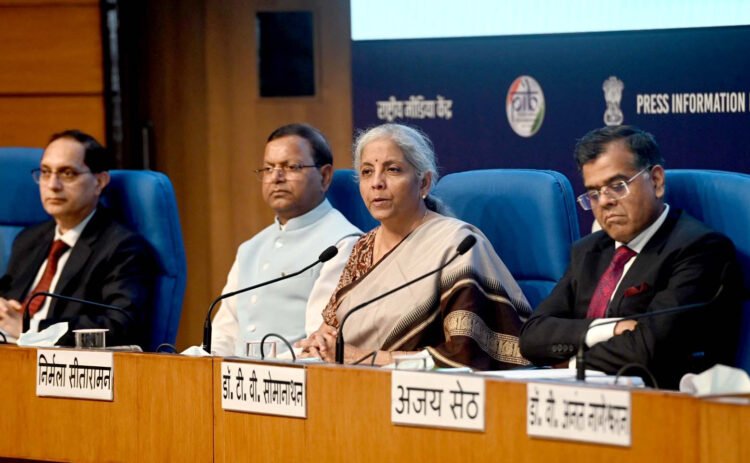No products in the cart.
What Union Finance Minister Nirmala Sitharaman Said About Tourism in Her Budget Speech
Union Budget 2024
Tourism has always been a part of our civilization. Our efforts in positioning India as a global tourist destination will also create jobs, stimulate investments and unlock economic opportunities for other sectors. In addition to the measures outlined in the interim budget, I propose the following measures:
- Vishnupad Temple at Gaya and Mahabodhi Temple at Bodh Gaya in Bihar are of immense spiritual significance. Comprehensive development of 17 Vishnupad Temple Corridor and Mahabodhi Temple Corridor will be supported, modelled on the successful Kashi Vishwanath Temple Corridor, to transform them into world class pilgrim and tourist destinations.
- Rajgir holds immense religious significance for Hindus, Buddhists and Jains. The 20th Tirthankara Munisuvrata temple in the Jain Temple complex is ancient. The Saptharishi or the 7 hot springs form a warm water Brahmakund that is sacred. A comprehensive development initiative for Rajgir will be undertaken.
- Our government will support the development of Nalanda as a tourist centre besides reviving Nalanda University to its glorious stature.
- Odisha’s scenic beauty, temples, monuments, craftsmanship, wildlife sanctuaries, natural landscapes and pristine beaches make it an ultimate tourism destination. Our government will provide assistance for their development.
Mr. Madhavan Menon, Executive Chairman, Thomas Cook (India) Limited (Thomas Cook, SOTC, Sterling Holidays and TCI)

Madhavan-Menon-Executive-Chairman-Thomas-Cook-India-Limited
This year’s Union Budget has opened new doors to development, specifically for domestic and inbound tourism. With the focus on special development funds/ programs for the socio-cultural-religious potential of iconic temple corridors including Gaya’s Vishnupad & Mahabodhi temples into world-class pilgrim and tourist destinations (to be modelled on the success of the Kashi Vishwanath temple corridor), the Government of India’s intent is encouraging. Additionally, the comprehensive development of the Rajgir Jain Temple site; rejuvenation of the historical gem of Nalanda & Nalanda University into a major religious-tourist centre, would have a multi-pronged impact. While positioning India as a vibrant global tourism destination, it will also accelerate job creation and economic opportunities for allied sectors.
The Budget also appreciated the underleveraged potential of Odisha’s tourism industry by supporting the state’s rich heritage-history, spirituality, craftsmanship and natural beauty.
Recognizing the high potential domestic cruise segment, the Union Budget announcement proposed a simpler tax regime to support/incentivize foreign cruise companies operating in India’s waters.
We’re optimistic about the significant allocation of INR 11.11 lakh crore (constituting 3.4% of India’s GDP) towards infrastructure development. The development of road, rail, air, and waterways will ensure a boost to access/connectivity and affordability, and force multiplier benefits for tourism and allied sectors.
When introduced, TCS was considered disadvantageous to salaried employees as their cash flows were negatively impacted. Post the Budget announcement, salaried employees can now avail of immediate credit of TCS paid on account of their foreign travel – against TDS on salary, enhancing the purchasing power of Indian consumers.
The discontinued SEIS scheme should have been reinstated, as this is meaningful towards encouraging inbound tourism, foreign exchange receipts and a force multiplier for employment generation.
We are disappointed to note that key pillars in India’s Tourism agenda – Aviation & Hospitality were not mentioned as part of the Budget and both standardisation of GST rates on hotel tariffs to 12% and the reduction of ATF remained unaddressed.
The Budget also appreciated the underleveraged potential of Odisha’s tourism industry by supporting the state’s rich heritage-history, spirituality, craftsmanship and natural beauty.
Recognizing the high potential domestic cruise segment, the Union Budget announcement proposed a simpler tax regime to support/incentivize foreign cruise companies operating in India’s waters.
We’re optimistic about the significant allocation of INR 11.11 lakh crore (constituting 3.4% of India’s GDP) towards infrastructure development. The development of road, rail, air, and waterways will ensure a boost to access/connectivity and affordability, and force multiplier benefits for tourism and allied sectors.
When introduced, TCS was considered disadvantageous to salaried employees as their cash flows were negatively impacted. Post the Budget announcement, salaried employees can now avail of immediate credit of TCS paid on account of their foreign travel – against TDS on salary, enhancing the purchasing power of Indian consumers.
The discontinued SEIS scheme should have been reinstated, as this is meaningful towards encouraging inbound tourism, foreign exchange receipts and a force multiplier for employment generation.
We are disappointed to note that key pillars in India’s Tourism agenda – Aviation & Hospitality were not mentioned as part of the Budget and both standardisation of GST rates on hotel tariffs to 12% and the reduction of ATF remained unaddressed.
















